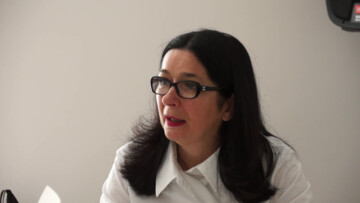Narrated by Zdenka Badovinac, Jesús Carrillo, Bojana Piškur, Ljubljana, January 2014
Our Glossary of Common Knowledge (GCK), unlike an encyclopaedia, makes no attempt to unite all the world’s knowledge in a single totalising system, or to assemble a variety of viewpoints under the roof of tolerance and inclusion. What makes the glossary different from similar efforts is that it does not make just one list of terms but is instead concerned with multiple lists. Each of its terms is always associated in different ways with terms from other lists and other contexts. Families of terms are thus created, and these families are the core of the glossary. Every term in the GCK has its own story, and every story has a narrator, who is present alongside the term. Indeed, it is only through the presence of narrators that we can build a glossary of common knowledge. The GCK therefore represents a multitude of first-person narratives, which confront and interact with each other.
The presence of narrators is something we have learned about from oral histories. The dialogical structure of oral histories and the presence of different protagonists have in fact made them one of the most important references for the GCK. At the same time, this model, especially in the form of interviews, has been an important research tool for compiling the glossary.
Although the spoken word is but one of the sources for the GCK, it is a key reference point for the entire work, and this is because we always associate a voice with presence. Our glossary seeks to redefine presence as something that is in constant tension with writing. Mladen Dolar, referring to a similar kind of presence, writes in his book A Voice and Nothing More: “The voice seems to embody a presence, a background for differential traits, a positive basis for their inherent negativity. To be sure, its positivity is extremely elusive – just the vibrations of air that vanish as soon as they are produced.” [1]
While the GCK goes beyond the metaphysics of presence, it also maintains its active position. In this sense, the GCK is a collection, not of authentic definitions, but authentic gestures – subjective positions within a world of international languages.
The point is not that we believe in the factual truth of oral histories, but rather that, with the help of such narratives, we try to change the existing order of things. Here oral histories interest us not primarily as alternative forms of historicising that are privileged over writing, but as a way to introduce multiple histories and truths, including the kind of psychological truths expressed in the imagination, symbols, and desire. Alessandro Portelli discusses all these things in his essay “What Makes Oral History Different”. Oral histories are fragmented and tied to the memory and the subjective perspective of the individual, the group, or the class. For Portelli, while orality is “saturated with writing”, the memory behind it “is not a passive depository of facts, but an active process of creation of meanings.” [2] Not unlike oral history, our glossary relies on the differential credibility of memory, and shows more transparently the relationship between histories and their protagonists.
The GCK acknowledges the tensions between the oral and the written, between the norm and deviations from the norm. In a very similar way, Giorgio Agamben describes the relationship between the rule and life: “Neither written word nor living voice, the rule constantly moves between these polarities, in search of an ideal of the perfect common life that [it] is precisely meant to define.” [3]
Through its reference to oral histories, our glossary stands in opposition to the institutions, classes, and elite practices that have dominated writing. Or, to put it better, it tries to create a model that offers greater possibilities for dialogue with those whose collective memories are yet to be written. History as a glossary of common knowledge is a history, not of the winners, but of diverse groups and individuals in various horizontal networks. In this way it becomes one of the most important tools in a new institutionality.
[1] Mladen Dolar, A Voice and Nothing More (Cambridge, Mass.: MIT Press, 2006), 36. [2] Alessandro Portelli, “What Makes Oral History Different”, in The Oral History Reader, ed. Robert Perks and Alistair Thomson, 2nd ed. (Oxon, UK, and New York: Routledge, 2006), 37. Originally published in 1979 in Italian, Portelli’s essay first appeared in English as “The Peculiarities of Oral History”, History Workshop Journal, no. 12 (autumn 1981), 96–107. [3] Giorgio Agamben, The Highest Poverty: Monastic Rules and Form-of-Life (Stanford, Calif.: Stanford University Press, 2013), 75.




